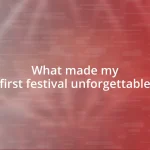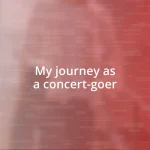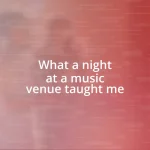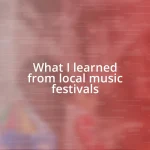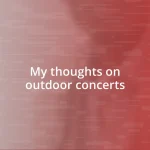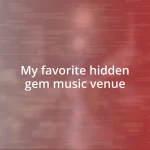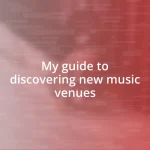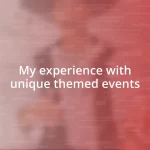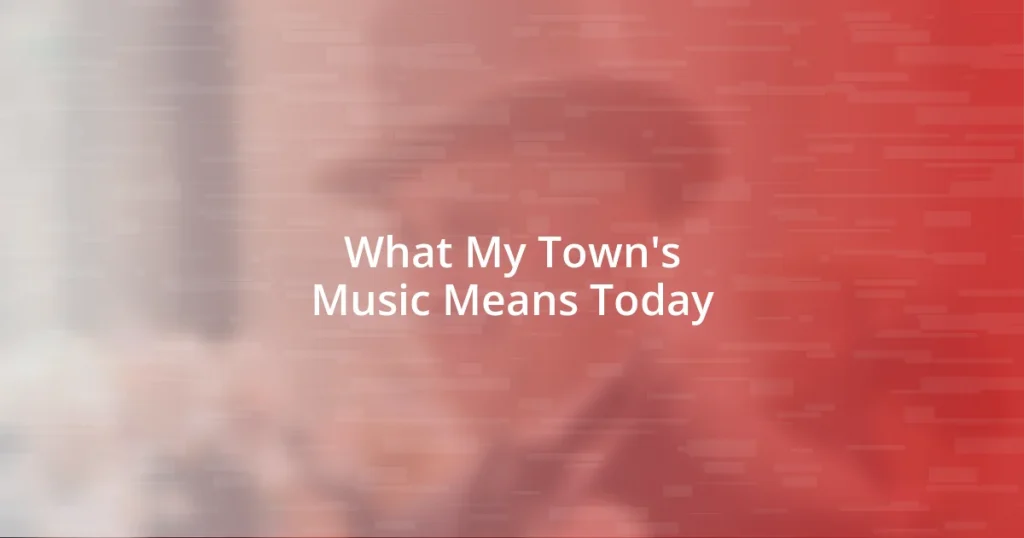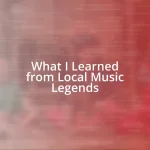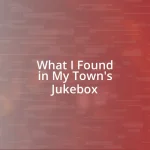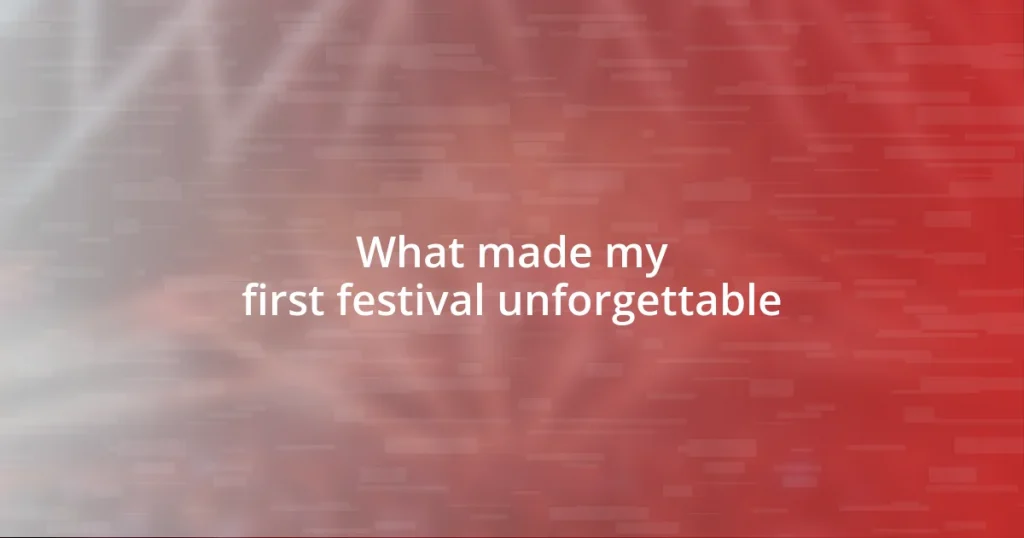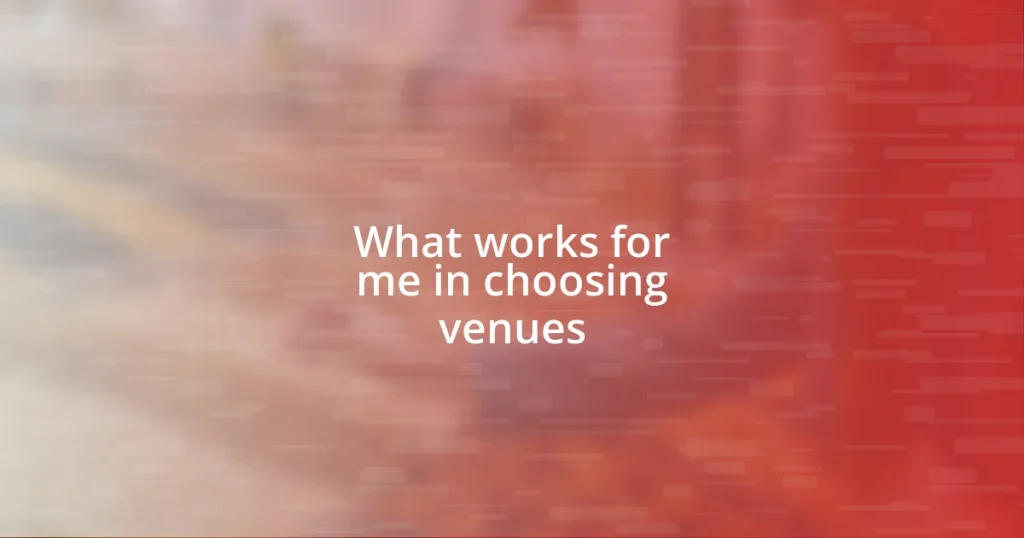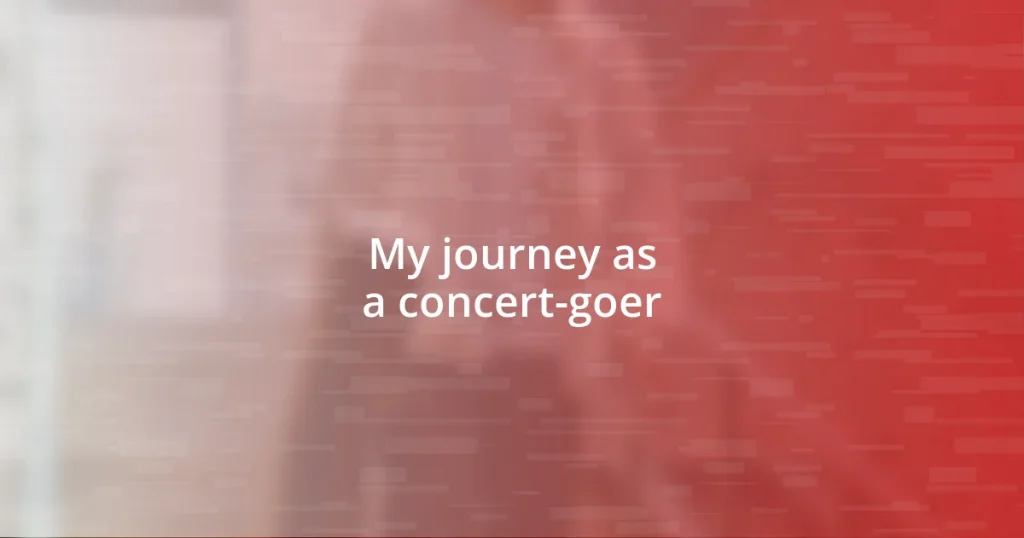Key takeaways:
- Music in the town serves as a communal language, connecting generations and evoking memories tied to cultural history.
- Local musicians play a vital role in social change, using music to address issues like inequality and foster community bonds.
- Current trends in music include genre-blending collaborations, digital engagement, and intimate performances that enhance emotional connections within the community.
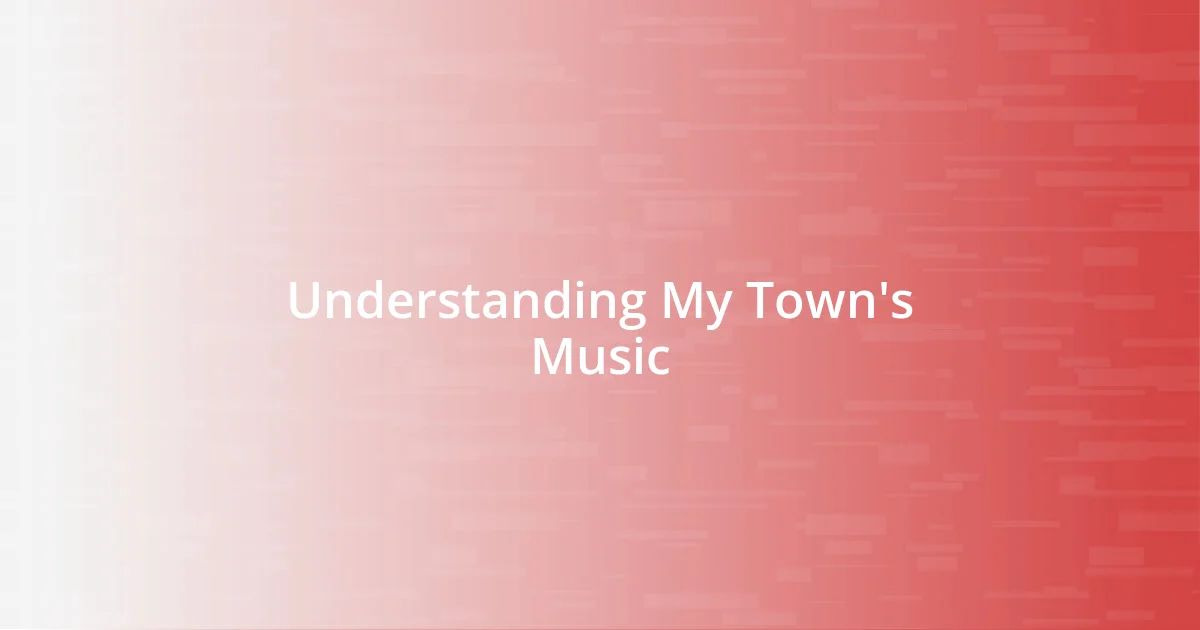
Understanding My Town’s Music
Understanding my town’s music is like peeling back layers of history, culture, and emotion. Each note resonates with memories, triggering vivid recollections of school dances, late-night jam sessions, and the feeling of community during local festivals. Have you ever felt a song capturing a moment so precisely that it brings you right back to that time?
In my town, music serves as a communal language that unites us, often bridging generations. I remember sitting in my grandmother’s living room, surrounded by the sounds of classic folk tunes that she cherished. For her, those songs weren’t just melodies; they were narratives of her youth, filled with stories of love and loss. Isn’t it fascinating how music can weave these timeless threads through our lives?
The evolution of our music scene reflects the shifts in our community’s identity. I often wonder how the vibrant beats of today’s hip-hop blend with the soft strumming of folk, creating a unique soundtrack for a changing town. It’s more than just sound; it’s a testament to our resilience and adaptability, capturing the essence of who we are right now.
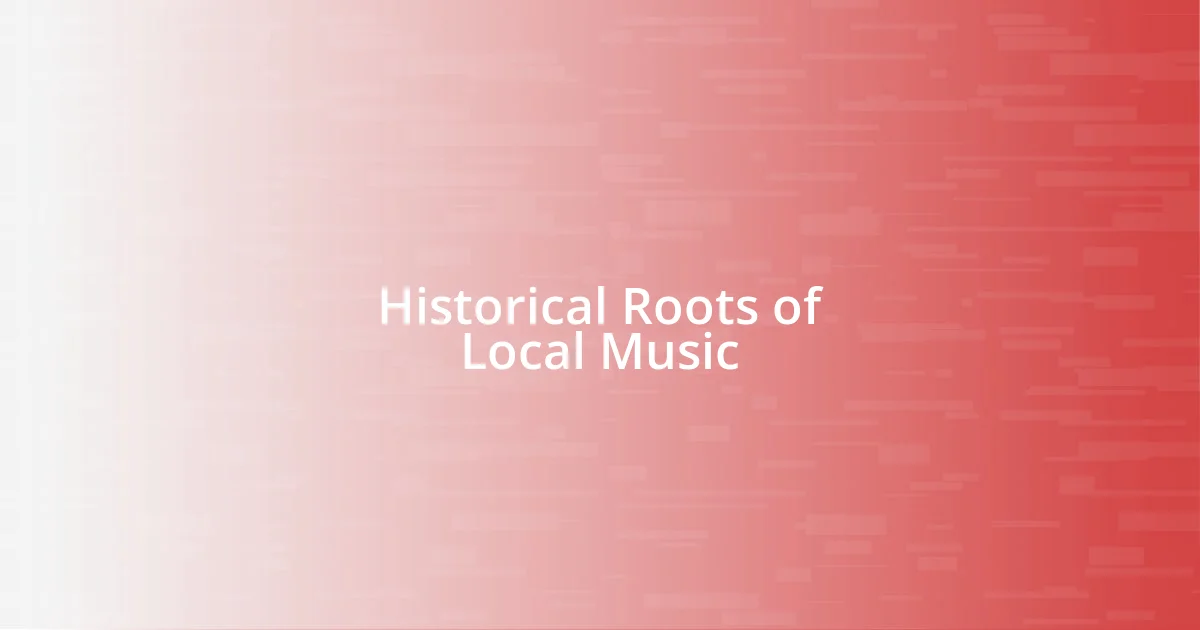
Historical Roots of Local Music
Local music has deep historical roots that reflect the diverse cultures and experiences that shape my town. I recall a time when I stumbled upon an old recording of a community gathering from decades past. The energy of that event surged through the speakers, showcasing a blend of traditional instruments and upbeat rhythms that seemed to echo our town’s evolution. Such moments remind me that every chord has a story, deeply intertwined with the lives of those who came before us.
- Early settlers brought their folk traditions, infusing our music with their heritage.
- The civil rights movement inspired powerful anthems that unified the community in shared struggles.
- Local musicians often used music as a form of protest, addressing issues like inequality and social justice.
- I remember my favorite uncle singing protest songs around the campfire, sharing tales of political upheaval woven into each lyric.
- The influence of immigrant cultures has broadening our musical palette, adding rich textures and rhythms to our local sound.
Every note we hear today resonates with those voices from the past, making our music a vibrant tapestry of history and emotion.
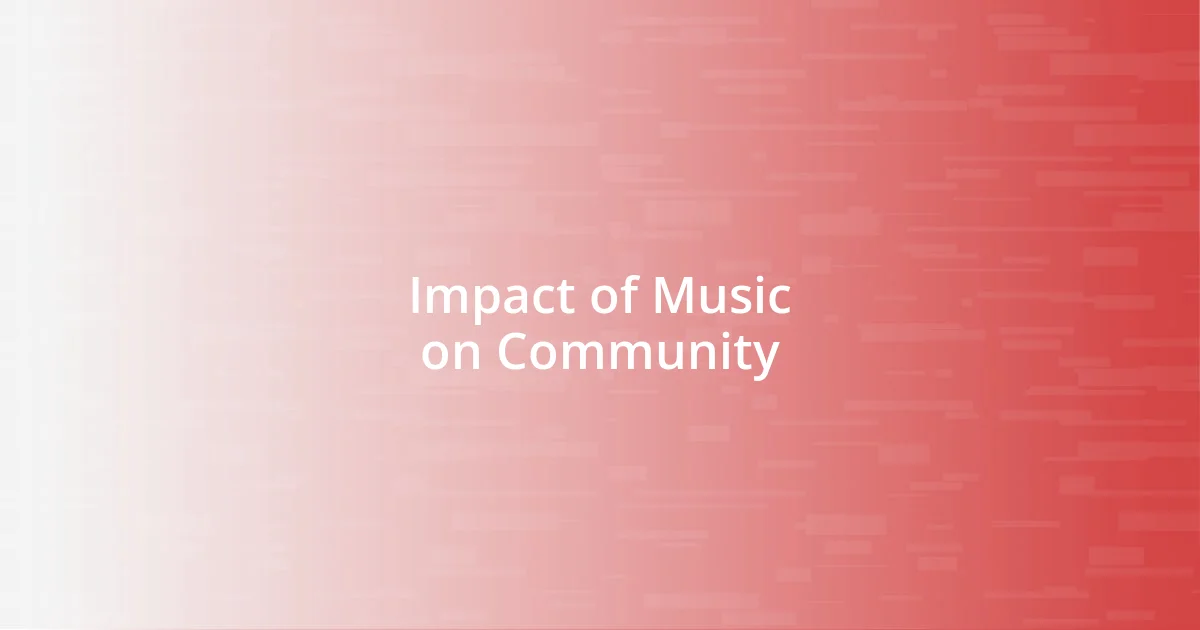
Impact of Music on Community
The impact of music on our community is profound and multifaceted. I remember my neighbors hosting backyard concerts, where families gathered to enjoy local bands. Those evenings were filled with laughter and joy, creating bonds that are often hard to forge in today’s fast-paced world. Music transforms not just our spaces, but our relationships, fostering a sense of belonging that resonates through every strum of the guitar or beat of the drum.
In addition, our town’s music scene acts as a beacon for social change and awareness. I once attended a music festival dedicated to raising funds for local charities. Each performance was infused with passionate messages that echoed our community’s shared values. It reminded me that music can inspire action, turning melodies into movements and helping to strengthen community ties further.
Moreover, participating in music—whether as a performer or listener—offers a unique form of emotional catharsis. I’ll never forget the feeling of solidarity when singing along to a favorite local anthem at a street fair. It’s as if all the worries of daily life faded away, and for a moment, we were united in joy and nostalgia. Music is, without a doubt, a powerful tool that enhances our community’s spirit and expresses our collective identity.
| Aspect | Impact of Music |
|---|---|
| Community Bonding | Creates connections and strengthens relationships |
| Social Change | Inspires awareness and prompts action |
| Emotional Catharsis | Provides relief and shared experiences |
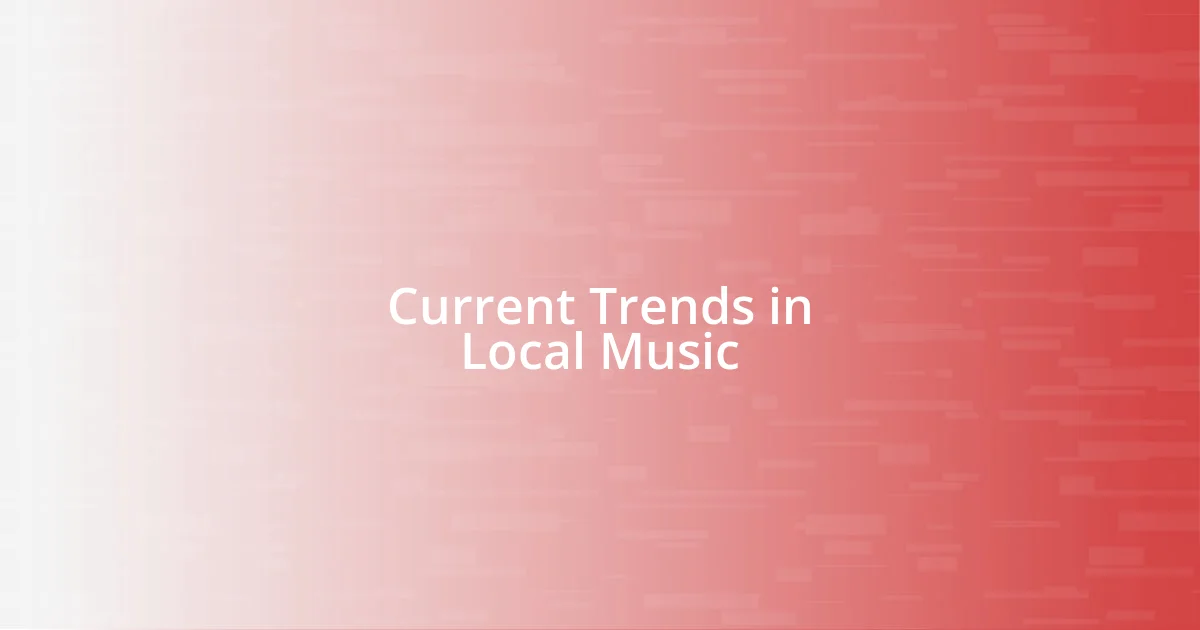
Current Trends in Local Music
Local music today is navigating exciting trends that connect us in new ways. For instance, I’ve noticed an increase in collaboration among artists, often blending genres that I never would have imagined working together. I recently attended a gig where a hip-hop artist teamed up with a traditional folk band, creating a sound that felt fresh and energetic, yet deeply rooted in our town’s heritage. It raises the question: how many amazing musical outcomes could we discover if we allow different influences to mingle?
Another significant trend I’ve observed is the shift towards digital platforms for local musicians. With the rise of social media, artists can now share their music easily and engage with the audience directly. I recall a friend’s solo acoustic set streamed live from his living room, attracting viewers from various corners of the globe. This access opens up conversations about our local music scene, making it feel more inclusive. How amazing is it that our town’s stories and sounds can reach ears well beyond our neighborhood?
Moreover, the resurgence of vinyl and intimate live performances has garnered attention. I’ve found such joy in attending small pop-up shows where the atmosphere feels less like a concert and more like a family gathering. It’s refreshing to hear artists interact with their audience, sharing their thoughts and inspirations behind each song. This authenticity fosters a deeper connection and reminds me of how impactful music can be when experienced in close quarters. Isn’t it fascinating how local music continues to evolve while staying true to the emotional bonds that draw us in?
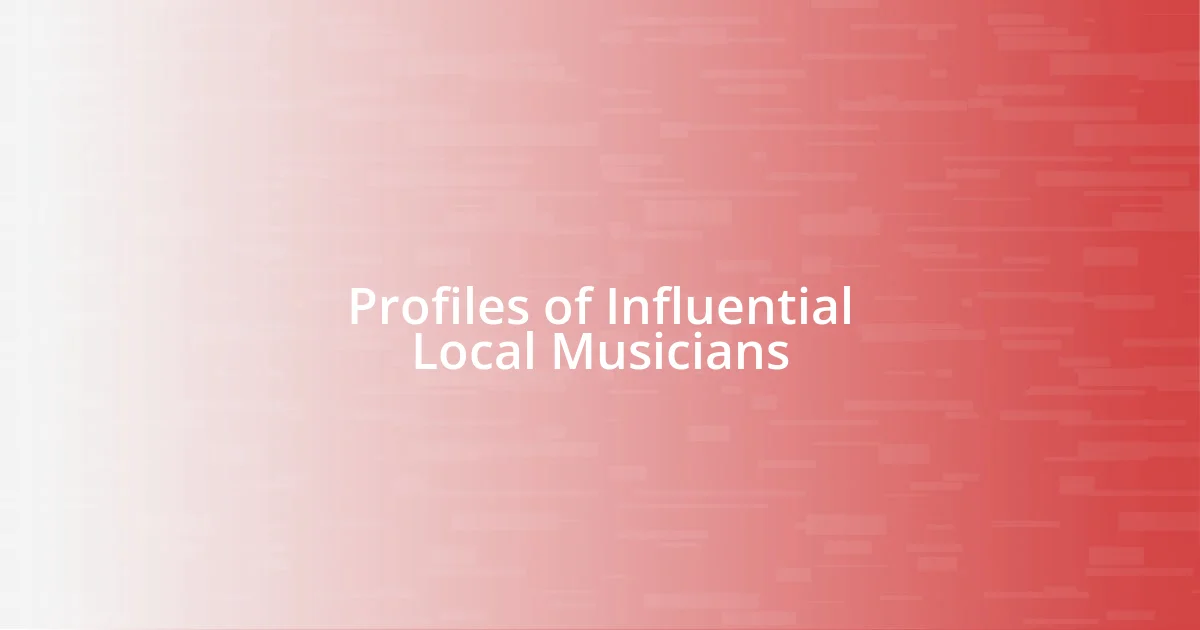
Profiles of Influential Local Musicians
One musician who stands out in our local scene is Sarah Jensen, a soulful singer-songwriter whose lyrics resonate deeply with our community’s experiences. I’ve had the pleasure of witnessing her perform at a cozy café where she weaved stories of love, loss, and resilience in her songs. It was incredible to see how her authenticity made even a room full of strangers feel like a close-knit family, humming along and sharing in the emotions of her music.
Another influential figure is Marcus Black, a dynamic rapper known for using his platform to address social justice issues. The first time I heard his powerful lyrics, it was during a rally that sought to amplify voices often overlooked. His words hit home, sparking conversations around important topics like equality and community empowerment. It left me wondering—how many lives can a single artist touch simply by speaking their truth?
Finally, let’s not forget about the inspiration brought by The Echoes, a local band that I often catch at outdoor festivals. Their fusion of traditional folk and contemporary rhythms has a unique way of bringing people together. I remember dancing with friends under the stars, losing track of time as their catchy melodies filled the air. It’s a poignant reminder that music, in all its forms, has the power to create moments that linger in our hearts long after the last note has faded.
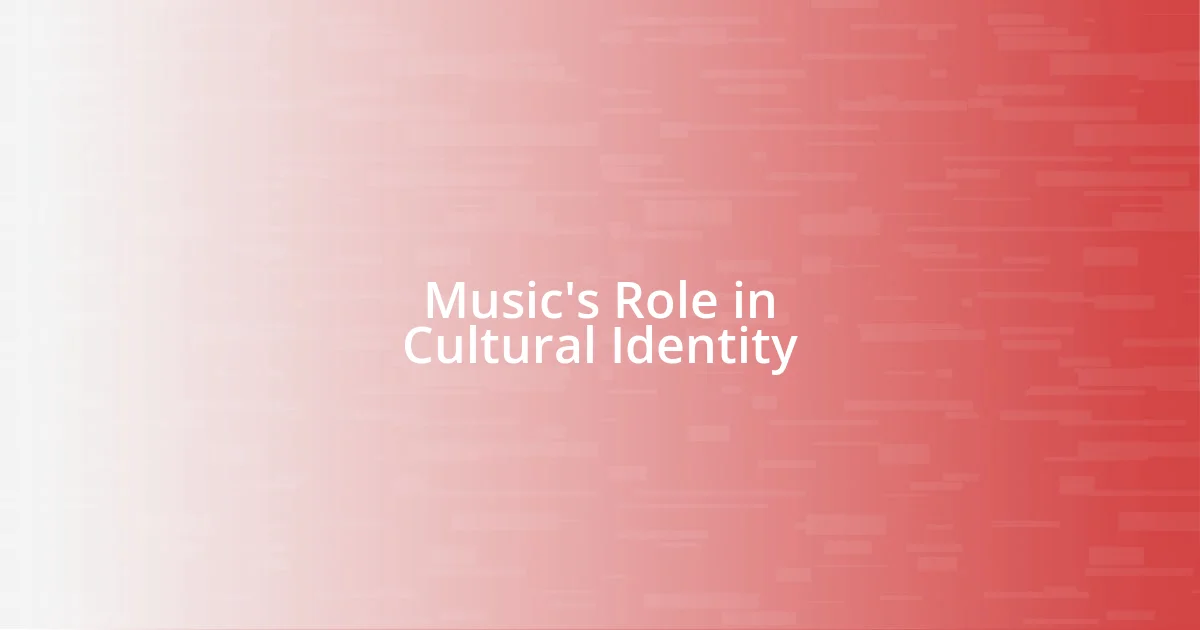
Music’s Role in Cultural Identity
Music is more than just sound; it’s a powerful vessel of cultural identity. Growing up in our town, I remember listening to my grandparents’ stories while traditional music played softly in the background. Those melodies were a direct link to our roots, reflecting our shared history and values. Isn’t it fascinating how a song can evoke memories and remind us of who we are?
In my experience, local music serves as a mirror of our community’s evolution. When I hear contemporary takes on classic songs, I feel a sense of pride knowing that our culture is adapting while still honoring its past. Recently, I attended a festival where different generations of musicians showcased their interpretations of timeless pieces. I couldn’t help but think: how do those adaptations reshape our understanding of cultural heritage and pave the way for future artists?
Moreover, music fosters a powerful sense of belonging. I recall a night at an open mic where musicians shared their personal experiences, often touching on themes of struggle and triumph that everyone in the audience could relate to. The tears, laughter, and applause created a vibrant tapestry of emotions, connecting us all. How can we underestimate the impact of this shared experience? Music not only captures our identity but also strengthens the bonds that keep our community alive.
